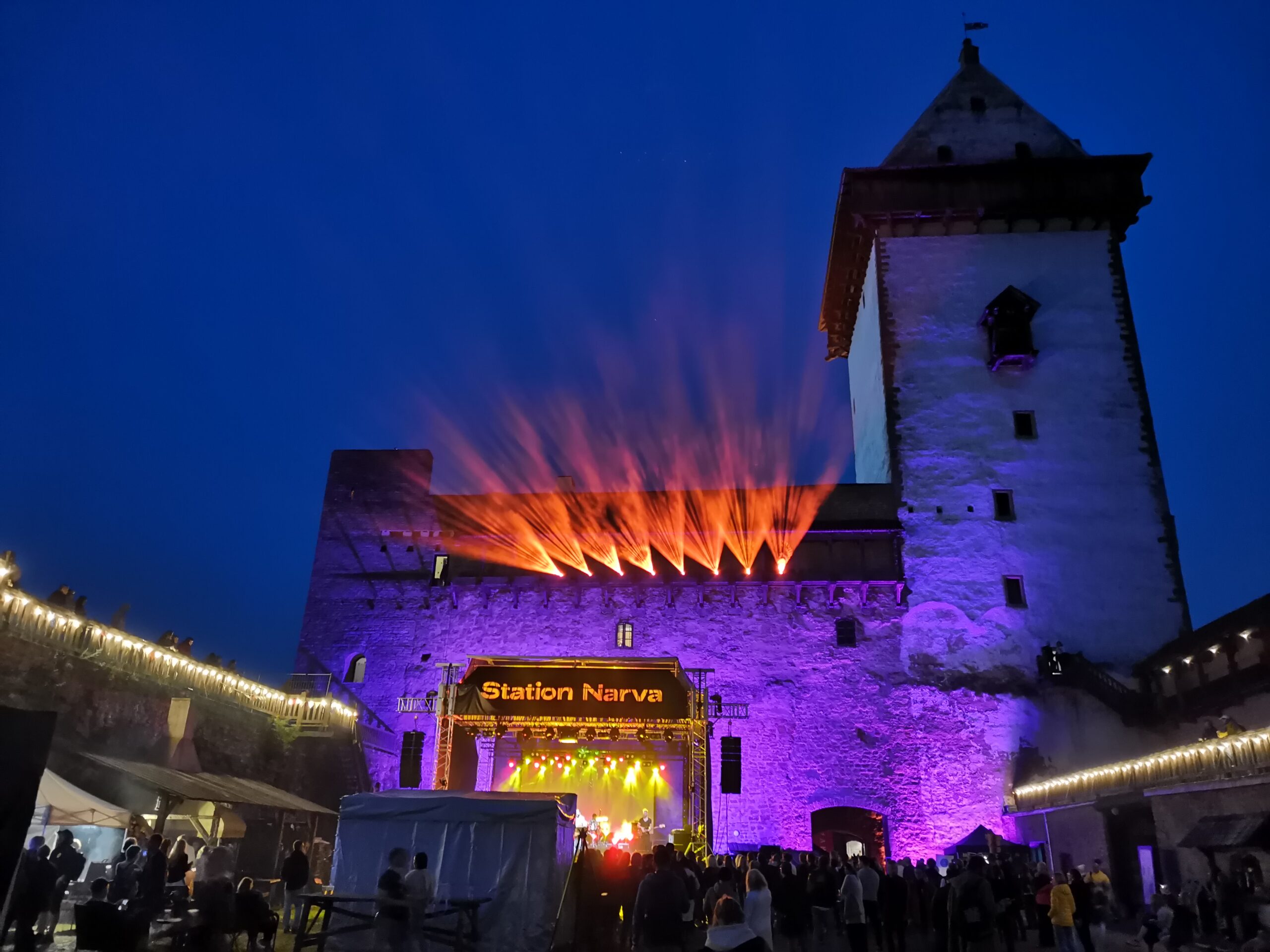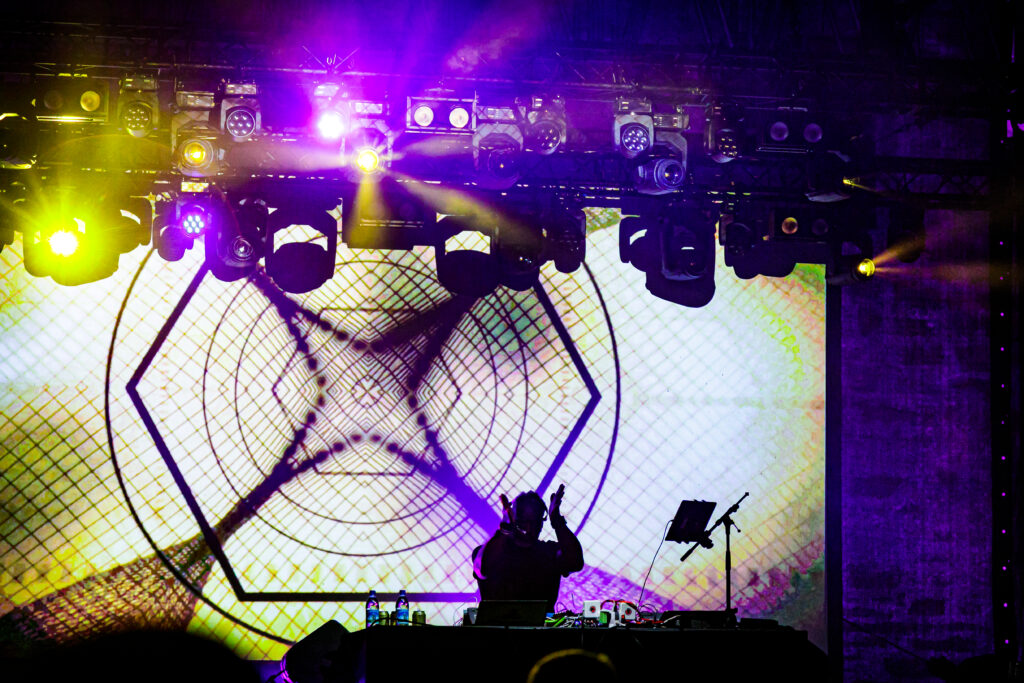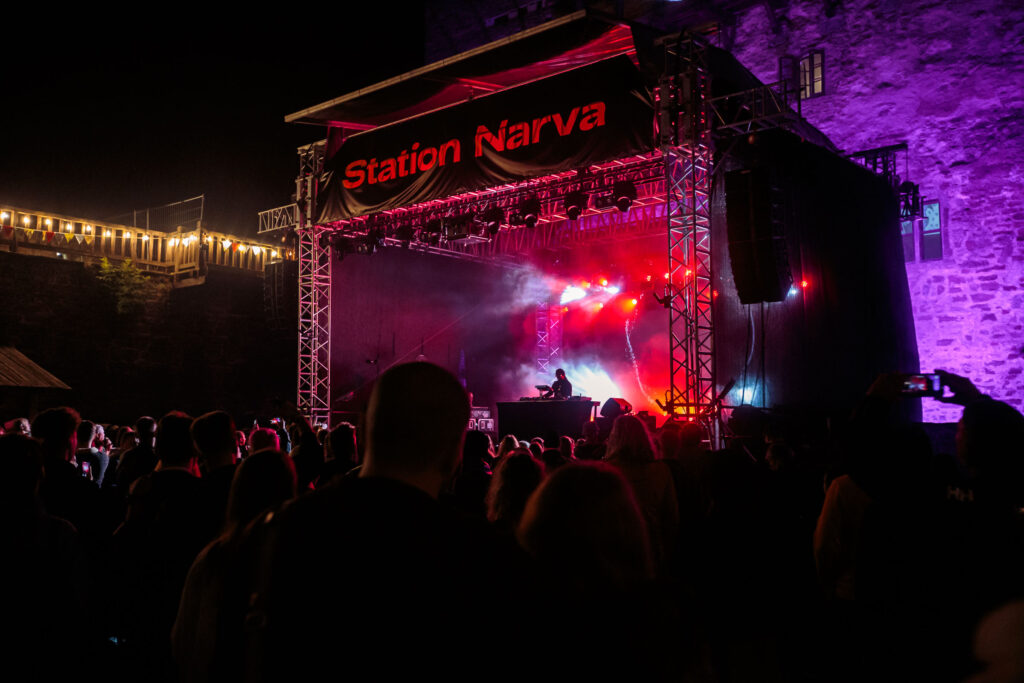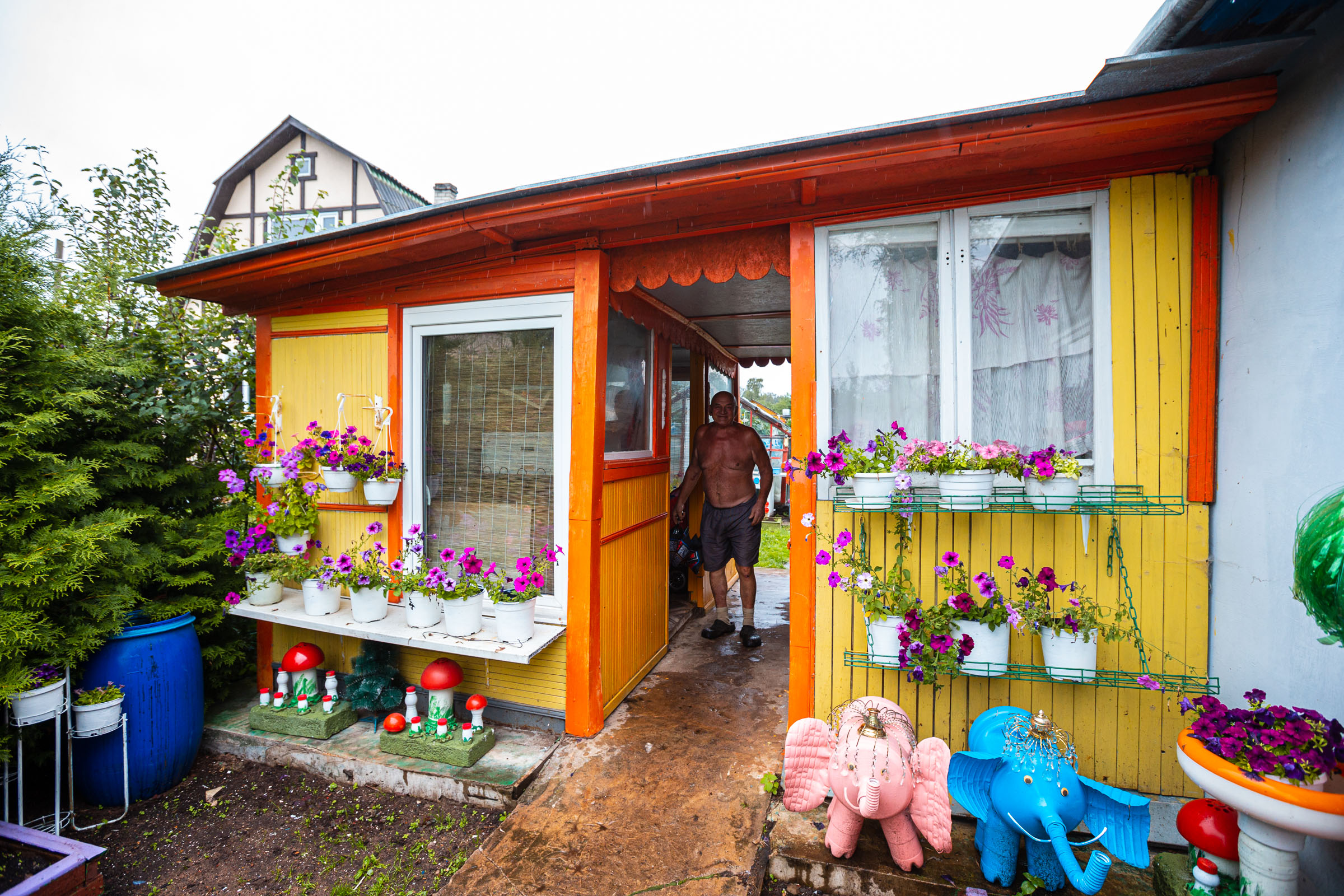The fourth edition of Station Narva festival drew nearly 3,000 attendees
The fourth edition of the music and city festival Station Narva that took place from 5 to 7 August in Estonia’s easternmost city Narva, gathered 2,297 attendees. Station Narva was one of the first large-scale events in Estonia to utilise a safety zone by implementing the digital COVID-19 pass and rapid testing.

The festival filled the easternmost city of Estonia with music from home and abroad, initiated discussions about the future of the region, and invited visitors to take a closer look at the unique dacha lifestyle in suburban Kudruküla.
The festival allowed access only to persons with a vaccination certificate or a negative COVID-19 test result. 53% of the visitors came with a digital COVID certificate and 47% with a negative rapid antigen test, taken on location. No positive results were found in the course of testing.
The centre of this year’s event was the Narva Museum, along with the historic 13th century Hermann Castle that attracted approximately 1,000 visitors to the festival site on both 6 and 7 August. Headlined by the British acid-house icon A Guy Called Gerald and jungle pioneer Roni Size, the festival’s 25-strong music line-up included, among others, Tatar-Russian electronic hip-hop duo AIGEL, Finnish alt-pop act New Ro and 15 Estonian artists from the electronic music pathmaker Sven Grünberg to the influential singer-songwriter-producer Vaiko Eplik and the dream-country group Holy Motors. In addition to the music programme, visitors had the opportunity to experience a night at the museum. The music programme extended also to the beloved Art Club Ro-Ro on the banks of River Narva.


The castle’s Western Yard saw both the opening of the Station Narva urban art competition winning project “Street Library” by Veera Gontšugova in its premises and public talks on the scale of an election debate hosted by the local BAZAR initiative. The creative incubator OBJEKT hosted a hybrid-format Business Day, which delved into the role of the creative economy in popularising the new business models in Ida-Viru County. Ahead of the Business Day, OBJEKT also hosted the Unicorn Squad technology camp for girls, the opening of the photo exhibition “4+4= infinity” and the public premier of the VR application “Invisible Narva”, created by the Baltic Film and Media School’s MEDIT centre.
Tours to the dacha district of Kudruküla, located between Narva and Narva-Jõesuu, proved to be especially popular. The dacha owners welcomed visitors and shared both their horticultural products, smart DIY-design tips as well as recipes for dream living.

Station Narva visitors also had the opportunity to take part in tours around the city of Narva and the Kreenholm Manufacturing Company’s industrial complex, see the exhibitions at the Narva Museum Art Gallery, enjoy a Narva-style breakfast at the VitaTiim informal learning centre, and attend free city stage gigs across the city.
Comments from the representatives of Narva, the festival performers and partners
Mayor of Narva Katri Raik:
“What city wouldn’t want a festival of national, or even international importance! Narva has that now. In its fourth year, you could feel that the locals had found Station Narva and accepted it as their own. It is very important that the festival has a strong local team and cooperates with local companies and organisations. That has helped Station Narva take root in a deep way. I very much appreciate Station Narva’s boldness, professionalism, and constantly working towards doing it even better the next time around. Persistence is the key!”
Executive Board member of the Narva Museum Maria Smorzhevskihh-Smirnova:
“Narva Museum has been host to various musical events before, but on the scale and format that Station Narva offered, it was a first time experience for us. For the museum, it was a bold step that entirely justified itself. The rooms got a whole new appearance for the festival time: in the halls and in our outdoor spaces, where everything has a historical feel to it, different musical styles rang out, light installations and laser shows gave us all an opportunity to appreciate the architecture of the castle from entirely new angles. The biggest success, however, in my opinion was the incredible atmosphere and the exceptionally high quality of the festival. In addition to the musical and gastronomical experiences, participants were offered various cultural activities from tours to discussions on many interesting topics. It was a great honour for us to work with the Station Narva team. I sincerely hope that the future will bring many more music and culture projects to the museum.”
Head of the Integration Foundation Irene Käosaar:
“Station Narva has become a part of Narva. In addition to the emotional charge, the festival gives local people the opportunity to contribute: to show their art, to develop business acumen, to elevate service levels. The diverse programme of the festival is what contributes most to Narva’s everyday life. This is not just a festival that lasts for three days. It’s a lifestyle that helps enrich the cultural life in Narva. We often talk about young people leaving Narva and, of course, while these festivals alone cannot solve that problem, it certainly does give young people a good reason to stay if there are cool events to take part in here.”
For the Russian-Tatar duo AIGEL, playing at the Station Narva was the first post-pandemic show abroad. “Everyone was smiling and giving off such a positive charge. We really didn’t expect such a warm welcome, because we had no idea whether people knew our songs here or whether they would understand us. The reception was fantastic.”
Station Narva Head of Community Affairs and BAZAR founder Valeria Lavrova:
“It was great that this year we had to do a lot less explaining about what is Station Narva. Our people already know about the festival. Personally, I discovered that in its core there are two seemingly opposite concepts – experimentation and safety. This festival always experiments with something that hasn’t been tried before, from venus to programme parts and performers, but at the same time it is very safe. I’m not even talking so much about health and, certainly, the now important certificates and QR codes, but more about the festival atmosphere and the extent to which the organisation has been considered. For example, while the dacha owners were a bit cautious at first, on the day of the tour they were all in high spirits and they had a great time. It was a truly heartfelt experience!”
According to Station Narva programme partner and Art Club Ro-Ro founder Roman Boiko, their venue, a favourite hangout among the bohemian clientele, has for years operated in a format similar to that of Station Narva, uniting music and art with invigorating atmosphere and discussions. “Everything, from our programme to our choice of personnel is at the service of this approach. We found a real battle partner in Station Narva – this festival experiments every year with different locations, artists and formats. For many others this would not be feasible, but they pull it off. I’m very happy that there are people coming to Narva, who appreciate our vision. While before our club had the reputation of a slightly strange, marginal place, then now we can see the respect. That makes us really happy!”
Cafe Muna owner Riho Leppik:
“The economic impact of Station Narva on small businesses that provide tourism and food services is significant. The three-day event brings in a turnover for local food providers that is equal to three weeks’ earnings during times outside of the festival. During the Station Narva days, all cafes that manage to provide at least somewhat modern, quality food, are filled with people wearing wristbands from morning to night. The local Narva resident is a much more passive consumer of tourism, culture and food services, which is why every tourist that comes to the region, whether from home or abroad, is very much valued. Of course, the festival also has a significant impact on accommodation enterprises in the region. While there are usually rooms available in Narva hotels, during the festival, last-minute bookers have to find accommodation outside the city. At the same time, the share of the local in the cityscape and festival-related events increased both visibly and audibly this year.”
Station Narva 2021 was organised by the company Shiftworks in cooperation with the Narva team. The organising team would like to thank all the performers, visitors, partners and volunteers.
Station Narva 2021 music festival performers: A Guy Called Gerald (UK), AIGEL (RU), AveNue (EE), Caspar Mágus (EE), Discours Synthetique (RU), Holy Motors (EE), HUNT (EE), Songs of KINO by Janno Reim & Stanislav Bulganin (EE), Kristjan Randalu (EE), Modulshtein (EE), Nathan Fake (UK), New Ro (FI), OOPUS (EE), Pale Alison (EE), Roni Size (UK), Sabin Soundsystem DJ-s Orav & Drummie, Saint Cheatersburg (EE), Sander Mölder (EE), Sven Grünberg and the Ensemble of the Estonian Electronic Music Society (EE), The RIG.(Russian Improv Group) (RU), Vaiko Eplik & Eliit (EE), View (FI), YASMYN (EE), УЕ (EE).
Partners: Narva Museum, Art Club Ro-Ro, OBJEKT, BAZAR, Narva Art Residency, Meeskond Security, Eldred, Narva Hospital, VitaTiim, Spinnaker, Narva City Development Foundation
Media partners: Postimees Group, Raadio 2, Põhjarannik
Production: Damn.Loud, Soundhouse, ShowEx, Strikken, Event Media, Ramirent, Storent, BGMD, RGB Baltic, Kemmerling, Fom-In-Art
Design and website: Erkin Antov
Interior design: Ott Kangur
Narva Museum’s lighting solution: Cuu Club, René Jõhve
Video: Vita Pictura, Ivar Murd
Photographers: Aron Urb, Anastassia Volkova, Anna Markova, Tanel Tero, Jegor Andreev, Daniil Širjajev, Lija Kobrisseva, Alesja Matrossova, Irina Kivimäe, Ilja Smirnov
Catering: Restaurant Rondeel, Muna Café & Catering, Van Foodie, Sushi Tiger, Alex Street Food,, Moe Distillery, Marjamäe, ROOTS coffee shop
Thanks to: Pavel Muravjov, Chairman of the trade union Vesna; Galina Vinogradova, Chairman of the trade union Elektron; Narva Youth Center
Supporters: the City of Narva, the Estonian Ministry of Culture, Integration Foundation, Cultural Endowment of Estonia, the Finnish Institute and the Nordic Council of Ministers, Startup Estonia, Fortaco Estonia
Station Narva’s international activities introducing Estonia as an attractive tourism destination of music and culture are supported by The European Regional Development Fund.

